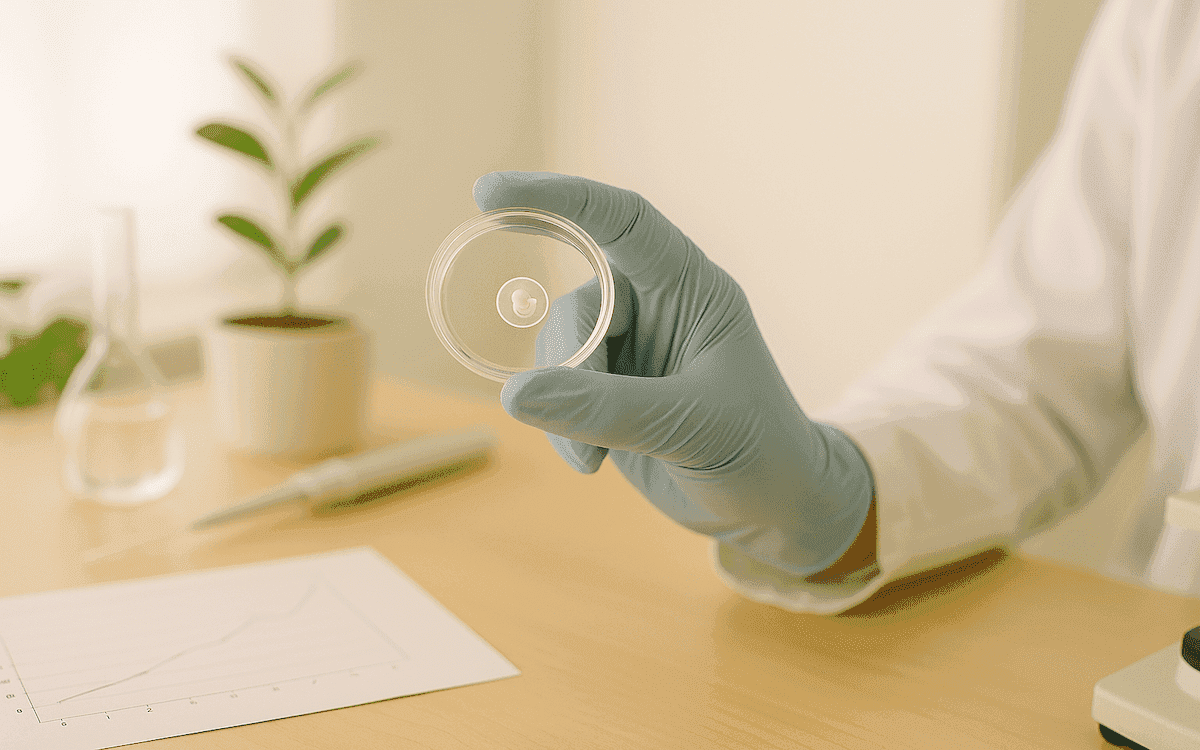

When Anna, 29, first heard her doctor say “You have PCOS,” she froze. Her first thought was about fertility: Would she ever be able to have children?
Polycystic Ovary Syndrome (PCOS) is one of the most common causes of ovulatory infertility, yet it’s also among the most manageable. Many women conceive naturally, while others find success through simple, targeted treatments.
Quick Answer: Yes, most women with PCOS can get pregnant with the right support. The best fertility treatments for PCOS include lifestyle changes, medications like Letrozole and Clomiphene, and assisted options such as IUI or IVF. Success rates typically range from 20% to 40% per treatment cycle, depending on age, hormonal balance, and overall health.
The path to conception with PCOS is not about luck; it’s about aligning the right treatment with your body’s rhythm.
PCOS is a hormonal imbalance that disrupts ovulation. The ovaries develop small follicles that fail to mature, preventing regular egg release. This doesn’t mean infertility, it means ovulation needs support.
Women learning about their diagnosis can explore How Do I Know If I Have PCOS to understand early symptoms, hormone patterns, and diagnostic criteria. Recognizing irregular cycles early allows for timely intervention and better fertility outcomes.
When ovulation is irregular, fertility treatments focus on restoring hormonal balance and stimulating egg release, which significantly increases the chances of natural conception.
Before medication or advanced treatment, doctors often start with lifestyle management. Research shows that small, consistent changes can restore ovulation naturally in many women with PCOS.
Anna started simple daily walks, balanced meals, and a fixed bedtime. Within months, her cycles became more regular, and six months later, she conceived naturally.
Even modest weight loss of 5–10% can improve insulin sensitivity and hormone balance. This step not only increases natural fertility but also enhances the success of medical treatments later.
For practical, evidence-based tips, How to Improve Fertility with PCOS outlines how nutrition, movement, and stress management can support ovulation and egg quality.
When ovulation doesn’t resume naturally, several effective medications can help.
Letrozole is now the most recommended medication for fertility treatment in PCOS. It triggers the brain to release hormones that stimulate the ovaries to mature and release eggs. Studies show 70–80% of women ovulate with Letrozole, and about one in four conceive within a few cycles.
Before Letrozole, Clomiphene was the standard first-line drug. It works by stimulating follicle development but may cause side effects such as a thinner uterine lining. It remains effective for many women, especially when cycles are highly irregular.
Metformin improves insulin resistance, one of the key metabolic issues in PCOS. By lowering insulin levels, it reduces androgen production and helps restore ovulation. It’s often used alongside Letrozole or Clomiphene to boost results.
Women curious about how hormones, nutrition, and fertility connect can find related insights in Conceivio’s collection on sperm quality vs. quantity and other metabolic-focused articles.
When oral medications don’t work, injectable gonadotropins are the next step. These hormones directly stimulate egg growth and ovulation. The treatment requires close ultrasound monitoring to prevent overstimulation, but results are excellent, many women conceive within a few cycles.
For women looking to optimize their overall reproductive health, Male Fertility and Age also highlights how partner age and health can influence success rates.
Sometimes, even when ovulation occurs, pregnancy doesn’t happen. That’s when assisted treatments can help.
IUI involves placing prepared sperm directly into the uterus during ovulation, improving timing and proximity. Each cycle carries a 10–20% chance of success, but the cumulative rate rises with multiple cycles. For couples where male factor or timing is an issue, IUI offers a gentle first step.
For women with PCOS who haven’t conceived after other treatments or who are older, IVF offers the best chance of success. IVF bypasses ovulation: eggs are retrieved, fertilized in a lab, and then healthy embryos are transferred back into the uterus.
Women with PCOS often produce more eggs during IVF, giving a better selection for fertilization. Success rates vary between 30% and 40% per cycle, depending on age, egg quality, and clinic expertise.
Those considering IVF can explore IVF Fertilization Failure, which discusses how egg quality, sperm health, and embryo development affect outcomes.
| Treatment | Average Pregnancy Rate per Cycle | Notes |
|---|---|---|
| Lifestyle changes | 20–25% (after ovulation resumes) | Improves insulin and hormone balance. |
| Letrozole | 20–25% | Most effective first-line medication. |
| Clomiphene | 10–20% | Works well in many cases. |
| Metformin (alone or with Letrozole) | 20–30% | Especially effective for insulin resistance. |
| IUI | 10–20% | Enhances timing and fertilization. |
| IVF | 30–40% | Highest success; depends on age and egg quality. |
Every treatment works differently for each person. What matters is consistency, early monitoring, and collaboration with a fertility specialist.
Even during medical treatments, your daily habits play a critical role. A balanced diet, gentle exercise, proper sleep, and stress management all help fertility medications work more effectively.
These habits don’t just support fertility; they improve long-term health by lowering inflammation and stabilizing hormones. How to Improve Sperm Health and Testosterone, Stress, and Fertility explore similar lifestyle connections that apply to both partners in conception.
Fertility treatment can feel overwhelming. The waiting, the medications, the uncertainty, it all takes an emotional toll. Many women with PCOS describe feeling disconnected from their bodies before finding a rhythm through support and education.
“By the time I started IVF,” says Lena, 37, “I stopped blaming my body. I started supporting it. That changed everything.”
Emotional resilience often determines how sustainable the journey feels. Counseling, fertility coaching, and connecting with others who share the experience can provide meaningful relief and hope.
What is the best fertility method for PCOS?
Letrozole is considered the most effective first-line fertility treatment for PCOS. It helps trigger ovulation naturally. For some women, options like Clomiphene, Metformin, or assisted treatments such as IUI and IVF may be recommended depending on age and hormonal response.
What age is peak fertility with PCOS?
The best fertility window for most women with PCOS is between the early 20s and early 30s. Egg quality naturally declines with age, even if women with PCOS tend to have a higher ovarian reserve.
Can infertility due to PCOS be cured?
While PCOS itself can’t be “cured,” infertility caused by PCOS is often reversible. With lifestyle management and ovulation-inducing medications, most women are able to conceive successfully.
Can you still be very fertile with PCOS?
PCOS doesn’t increase fertility, but once ovulation returns, women with PCOS can conceive at similar rates to those without the condition. A healthy lifestyle and proper treatment make a big difference.
Will my baby be healthy if I have PCOS?
Yes. Most women with PCOS have healthy pregnancies and babies. Managing blood sugar, weight, and hormones before and during pregnancy reduces risks like gestational diabetes or preeclampsia.
Does PCOS get worse with age?
Symptoms can change over time. While menstrual cycles sometimes become more regular, metabolic risks such as insulin resistance and weight gain can increase with age if not managed.
Which vitamin reverses PCOS?
No single vitamin can reverse PCOS, but nutrients like Vitamin D, inositol, magnesium, and omega-3s can support hormonal and metabolic health when taken appropriately.
How to avoid miscarriage with PCOS?
Focus on stabilizing insulin levels, maintaining a healthy weight, and balancing hormones before conception. In some cases, doctors recommend progesterone or Metformin during early pregnancy to lower miscarriage risk.
What is the root cause of PCOS?
PCOS develops from a mix of genetic and environmental factors. The main drivers are insulin resistance, hormonal imbalance, and inflammation, which affect ovarian function and hormone regulation.
What happens if PCOS is left untreated?
Untreated PCOS can lead to long-term issues such as type 2 diabetes, endometrial changes, high cholesterol, and cardiovascular risks. Early diagnosis and care can prevent most complications.
Are you born with PCOS or do you develop it?
You’re born with the genetic tendency toward PCOS, but symptoms usually appear after puberty. Hormonal changes, insulin resistance, or lifestyle factors can make them more noticeable.
What lifestyle leads to PCOS?
Lifestyle doesn’t cause PCOS, but poor sleep, high stress, and diets high in refined sugars can worsen symptoms by increasing insulin resistance and hormonal imbalance.
What is the 30-30-30 rule for PCOS?
It’s a lifestyle approach suggesting 30 grams of protein within 30 minutes of waking and 30 minutes of movement daily. It’s not medical advice but can help regulate blood sugar and energy.
Why did I suddenly develop PCOS?
PCOS doesn’t appear overnight. Symptoms may become visible after weight gain, major stress, or hormonal changes that reveal an underlying predisposition.
What should people with PCOS not do?
Avoid skipping meals, crash dieting, excessive caffeine, or chronic sleep deprivation. These habits worsen insulin resistance and disrupt hormonal balance.
Does PCOS qualify you for Ozempic?
Ozempic (semaglutide) isn’t approved specifically for PCOS but may be prescribed off-label to manage insulin resistance and weight when medically justified. Always consult your doctor before starting it.
How to lose 20 kg with PCOS?
Sustainable weight loss comes from a calorie-controlled diet, protein-rich meals, resistance training, and good sleep. Medical options like Metformin or GLP-1 medications can help when needed.
What triggers PCOS to start?
Genetic predisposition combined with hormonal changes during puberty, stress, and insulin resistance often triggers PCOS symptoms to appear or worsen.
PCOS may make conception more complex, but it rarely makes it impossible. With the right mix of lifestyle care, ovulation medications, and assisted treatments, most women with PCOS achieve pregnancy.
Understanding your hormonal pattern, acting early, and building trust in your medical team can make a world of difference.
At Conceivio, we believe fertility care should combine science with empathy. If you’re exploring fertility treatments for PCOS, our specialists can help you choose the most effective path—one that respects your body’s rhythm and supports your long-term health.
4.7 rating on App Stores